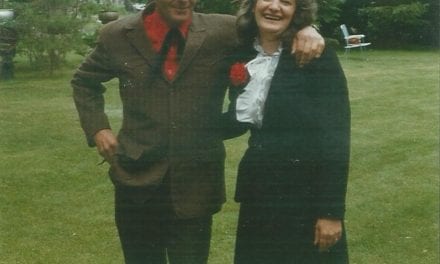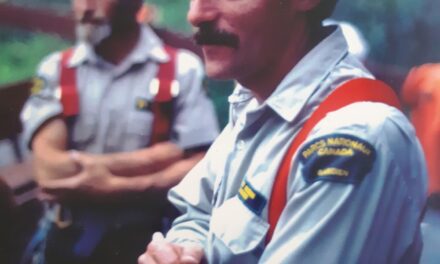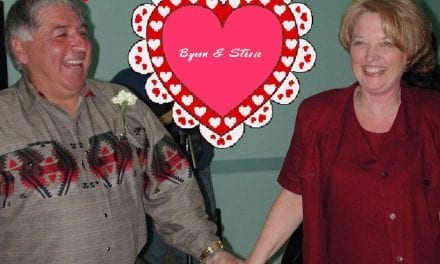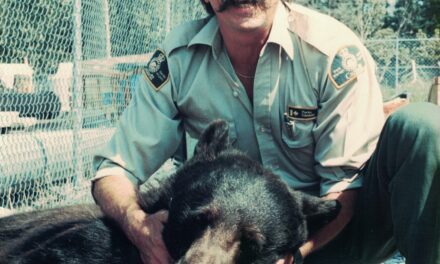(1:24:42) Bob – I guess the down point of it was and still is the controversy of really what is Parks Canada going to do with proper 21st century law enforcement concepts. I kind of left in the middle of that. In some ways I blame myself and chief park wardens because I was chair of some of those committees. We were not getting clarity from upper management about really what they were doing. I learned that long ago, that you can’t push a wet noodle up hill. Some of those people up top had to tell you what they wanted and push it down and basically they didn’t have the balls to do it. So that was one of the sad points in my career and it came right at the very last part of it. If there is anything negative about this whole interview it is that people like Tom Lee did not do their job as far as pushing what they really wanted down and clearly telling you what you needed to do. They had a bunch of good solid public servants that had proven themselves over the years muddling around, arguing with themselves about what should happen.
(1:26:10) Pat – And expecting this would happen…You know the warden service were always take charge people. I just find the whole thing so sad because they sort of exemplify, I think what an agency should be like. Working together, but having strong individual skills and supporting each other, yet not being afraid to strike out on their own. All sorts of skills. They picked up the ball that never was handed down from Ottawa and then Ottawa seemed to resent it.
(1:26:44) Bob – This occurred after I left in 1998, but upper management zeroing in on resource conservation, resource protection people that for 50, 60 years in Canada had been people who were adjusted to change. I mean my whole career for 31 years was one great big constant change. To identify that core group of resource conservation staff, i.e. park wardens, as not willing to change was totally ludicrous. But you have to know what they want and they were definitely not telling us. It was a divide and conquer situation. Then pushing it so far that union representatives started getting involved and then make it into a union management problem, instead of a proactive management issue. Anyway that is my rant!
(1:27:53) Pat – I feel too that nobody could really have understood and known how vindictive they could be. I feel that in the end it was a giant pissing contest and they were going to win and I am several steps removed from it, so that is an emotional, more of a gut reaction thing. I have never been so disappointed in a group of people in my life as the crew that decided to destroy the warden service.
(1:28:30) Bob – We’ve continued on living in Banff and being very much involved in Banff. We still know many of the folks and are trying to get to know some of the newer folks that are in parks. There is a lot of them changing. But both Pat and I to this day still support the National Parks concept. I think that Canada has done a great job. There have always been hiccups from day one I imagine, but we absolutely appreciate having an opportunity to stay in Banff and we got involved with the community and we continue on trying to be good Banff citizens, good Canadian citizens. We are going to continue on using those trails until we are worn out, because they won’t wear out!
(1:29:31) Pat – I think it is safe to say that the mountains and Parks got firmly a hold of our hearts…When people were looking for places to retire we went to Vancouver Island on a holiday, but you know it just didn’t have the glow. Around Victoria is nice, but we came home to Banff and thought “Oh!” There was just no inclination to leave. If we had moved some place where it was cheaper we would have spent all our money coming back here to play!
(1:31:06) Pat – I’ve always loved dogs and when we were in the backcountry, in the Rocky River Bob said, “We can’t have a dog in the backcountry. It doesn’t go with being a warden, having a dog off leash.” (In response to the question, “Are there any other stories that you would like to add?”) So we moved to Athabasca Falls and I was on it right away. We got a pup, honestly two weeks after we moved, a little Samoyed. I think that number one, Bob was shocked. I am sure he has always liked animals, but I don’t think he realized what an animal nut I was. And I loved this puppy! (Avi, short for Avalanche). We went up the Whirlpool and she wasn’t very old because we got her when she was four weeks old. Her mother had died.
(1:31:41) Bob – That is when old Fly (the horse) laid down and rolled on you and you were holding on to Avi.
(1:31:47) Pat – I didn’t drop her! But further up country remember we were going uphill and there was a rock, quite a big rock sloping into the trail. Again, I wasn’t paying attention and my horse went above it because I was looking for the camera and I slipped and off the horse I went again. I stood up just like a gymnast holding my puppy! Oh boy, did I get hell for that! Not paying attention and this was the second time I had not being paying attention and I could have got hurt. One year later, because we went in the fall and Bob is turned around and he is telling me a story. We are near the big rock and Bob’s horse goes above the rock and Bob slips out and he is down. So I tried to use the exact same words that he used, but I was laughing too hard so it didn’t have the same effect!
(1:32:37) Pat – We do have lots and lots of stories. Maybe when we read the transcripts some of them will twig that this should be in it too. Just to give a flavor because I think it is part of what living in the park was about. Your mom and dad would have had lots of stories and you and John I am sure have lots. It is one of the huge benefits of having lived here is the wonderful experiences of being around national parks. I feel badly that it is going the way it is right now. Like Joni Mitchell says, “You pave paradise and put up a parking lot.” I feel like you don’t go back when you start, there are some things that you can’t undo and I don’t like the direction it is heading right now. But that is my own personal little bias.
(1:33:31) Bob – From our political aspect when you look at Parks and they are a good example of that, especially if you read Ted Hart’s book on Harkin (J.B. Harkin – Father of Canada’s National Parks) from the ups and downs of the first 20 or 30 years, it was a roller coaster. As you change political climates there will be ups and downs. We did live in a heyday of evaluating our resources and how people use them. What comes out of that is every time we hired a researcher or a researcher was working for us, I always knew what the outcomes were going to be. The researcher would make a recommendation of closing something down. We followed that format and in many cases it was a good idea, but the problem is you chased away opportunities given on the visitor services side. Having worked over in that side for a while realizing that there is a profit loss sheet in everything. If you went too far you get negative reaction. And it has taken a long time, I think it has taken the last 20 years, restrict, restrict and now all of a sudden there is a backlash and a swing. But those pendulums will go up and down. I don’t believe that it’s the end of the world, but you do lose a little.
(1:35:04) Pat – People who know us well know that there is lots of interesting, rather loud discussions in our house at times. But you know the profit loss thing that really bothers me because I feel like national Parks should be an intrinsic value to Canadians. That’s the number one. Really, it was the government under Mulroney that we had to make Parks pay. I think right away that was the wrong direction to go because if we value something enough, we as tax payers should be willing to pay for it. Not that there isn’t opportunities for businesses, please don’t get me wrong. We have friends who are business people and I think that they have integrity and they respect the national parks so that is not it. But I do think perhaps when things get too wild with closing things down too far we aren’t keeping parks real for the people. If everything gets shut and you can’t go here because of this and you can’t go there because of that, it is not good. I think you have to be out and about in the national parks to really appreciate what they are. In the early 1970s when people started backpacking and getting into the parks, I think it was that hippy generation that really learned to understand what parks were about. Until then it had mainly been the outfitters taking people in, so I think that it expanded broadly then when people got out.
(1:36:28) Bob – You just called yourself a hippy.
(1:36:30) Pat – Well I looked like a hippy. I was way too prissy to really be a hippy, but I wore holey jeans and I had long hair! That gave me a little bit of a hippy status. People were always giving me the sign and I always got it wrong. They would give me the peace sign and I would give them the victory sign!
(1:36:48) Bob – But you were one hippy that (local Banff outfitter) Bert Mickle would like.
(1:36:55) Pat – I loved Bert!
(1:36:56) Bob – An old outfitter and a hippy!
(1:36:59) Pat – He sensed that I wasn’t a true hippy!
(1:39:08) Pat – I think for me the first time that I went on a hike out of Lake Louise when I was waitressing there. (In response to the question, “Do you have any lasting memories?”) I got up above into the alpine and then even above and I looked around and there was such a wow factor. I think that moment changed my life. That was so strong. I had been kind of an insecure teenager and somehow something clicked with me there. Then it turned out when I went to Waterton I found out that Bob actually really had strong park values. Like he wasn’t just that crazy group of guys that I saw partying. He taught me way more than I could have ever taught him about Parks and park values. I remember that so well, I was just WOW!
(1:40:03) Bob – Well, I always had a sense of the value. You know where Scott Lake Hill is (on the TransCanada highway). There were two or three years in my life between 1963 and 1964 where I came in from the prairies because that is where I was working at the time. I would come over that hill and the sense of the mountains there…I always had a sense that I was coming home. Even though I had only spent a couple of months in Lake Louise at that time in 1963 and then weekend visits. I even thought about that the other day as I was coming over the hill, thinking how wonderful it is…
(1:40:56) Bob – From a warden perspective I remember just the total awe of coming around the corner with Bert and June. I had volunteered to help them fix up a floor stringer that was underneath the kitchen at Skoki Lodge. Seeing Skoki for the first time, the rustic log building and knowing some of the characters, I was in total awe. Then that fall I had hiked into Skoki to close it up for the winter. Coming over Deception Pass and running into Gerry Lyster who was the Cyclone warden in those days and there he was with a good looking saddle horse, calm, wasn’t stupid, wasn’t trying to kill him and two pack horses and he was packing hay into Cyclone. All this equipment was just right and he was comfortable. It was a wet day, but he had a slicker on and he had everything together. I thought you know there is the life. That’s the life. Then about four years later coming into Indianhead and running into Monty Rose and there he was the same, two pack horses and a saddle horse. Maybe it wasn’t all that great in his eyes, but I had just ridden in from the Saskatchewan River with Donny and Ron Hall chasing 30 head of horses. We traveled 40 miles that day and I was thinking “Now that’s the life. I’ve got to get organized and do that.” That is when I decided I am going to get a job at the Lake Louise ski area and learn how to ski. I’ve got horse skills. Let’s see if I can give this competition a shot. I remember Monty saying, “Hell, you won’t have any problem getting on.”
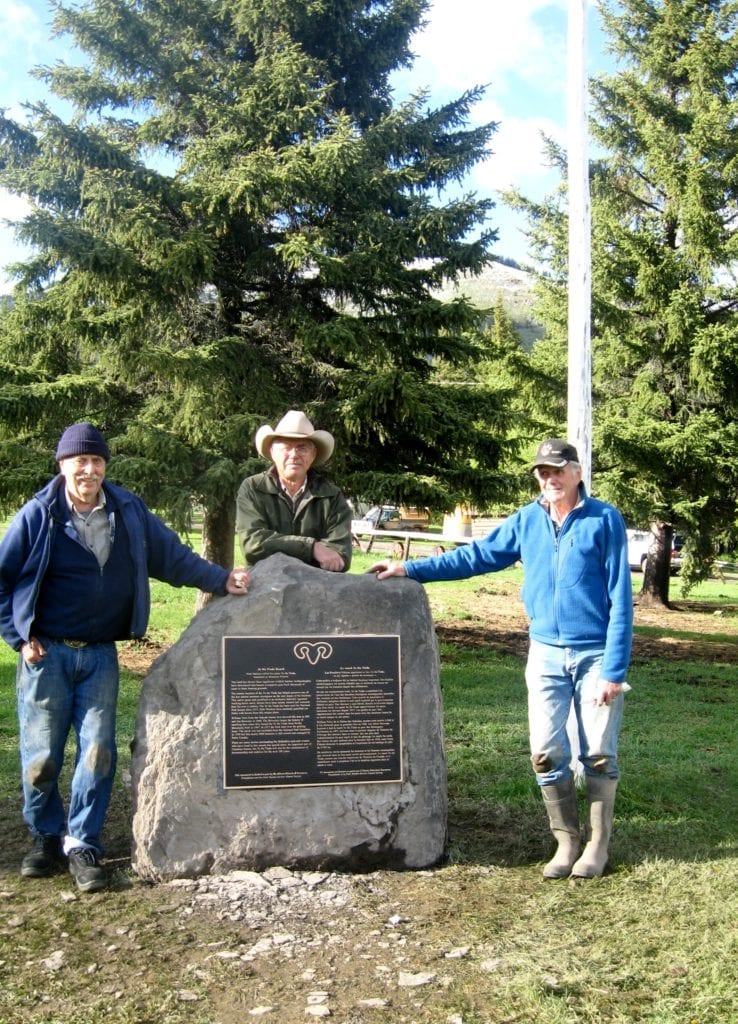
Don Mickle, Rick Smith and Bob Haney, Ya Ha Tinda Centennial plaque
donated to the ranch by the Park Warden Service Alumni Society 2017.
Don Mickle photo collection.
(1:43:15) Pat – This is just a personal moment for you. I didn’t really even know very many wardens at the time. It was 1969 because Donny and Bob weren’t wardens then. I knew them as the Mickle cowboys. Ellen and I had hiked from Mosquito Creek and we were coming to Banff via Pulsatilla Pass, Molar Pass, and Badger Pass. We had planned on doing it in 10 days just because we wanted to wander around and it rained almost the whole time. We were near Stoney Creek and we had come out and there was a warden truck. It was your dad and Brian MacDonald. I am sure that they thought that we were crazy. We were in blue jeans and we were mud up to our eyebrows and I had a foamy tied to the bottom of my pack that must have weighed 20 pounds because it was so wet! But they were so nice. They weren’t rude. We would have looked like hippies too, very dirty with long hair. They were so nice, they picked us up and they drove us from Stoney Creek to Banff. That was definitely the most comfortable I had been in seven days! I remembered both Brian and Keith’s names. Obviously they made a real impression. I’ve remembered their names to this day and I can see their faces. I am sure it was one of confusion, looking at these two young girls who obviously didn’t know anything about the backcountry out in the backcountry!
